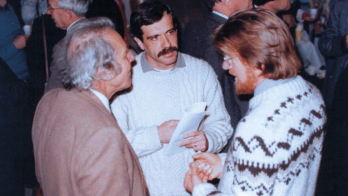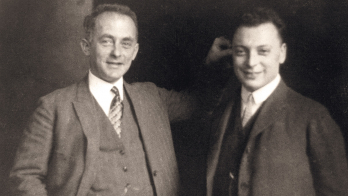by István Hargittai, Oxford University Press. Paperback ISBN 9780195365566, £8.99 ($15.95).

The music was enchanting. The Dysons stopped before the door, not wanting to break the magic of the superbly played Bach prelude. When the last cadence had rung down they walked in to find Edward Teller sitting at the piano apologizing that he was just passing by and that the instrument begged to be played while he was waiting for them to return home. It was a remarkable journey that had brought Teller, best known as the father of the hydrogen bomb, to the Dysons’ home at Berkeley. Even more remarkably, his journey was not without parallels.
If we were to trace back the wordlines of influential physicists to their birth, we would find several of them to converge in a tiny domain of space–time: Budapest, fin de siècle. In fact, those of Theodore von Kármán, Leo Szilard, Eugene Wigner, John von Neumann and Edward Teller never really diverged significantly. These compatriots all went from Hungary to Germany and eventually to the US. And they all changed the history of the 20th century.
Kármán Tódor, Szilárd Leó, Wigner Jeno˝, Neumann János and Edward Teller (Teller Ede in Hungarian) were all born to well-to-do Jewish families living within walking distance of each other. They all completed their studies in Germany, learning from masters such as Ludwig Prandtl, Albert Einstein and Werner Heisenberg. Eventually they found refuge in the US from the menace of anti-Semitism, where they all joined the defence effort: von Kármán helped establish the modern US Air Force and founded the Jet Propulsion Laboratory; Szilard patented the nuclear chain reaction and triggered the Manhattan Project, through a letter signed by Einstein to President Roosevelt; Wigner played an instrumental role in building the first nuclear reactor; von Neumann did important calculations for the Manhattan Project and described the principle of modern computer architecture; and Teller drove the creation of thermonuclear weapons.
In his book, first published in 2006 and now available in paperback, István Hargittai follows the lives of these five “Martians of Science”, and asks the inevitable questions: What was behind this remarkable surge of talent? Was it just a random rogue wave? What made these broadly educated, brilliant men seek the ultimate weapon? How did they see the role of scientists in society?
The author makes a critical assessment in the final chapter of their roles and weightings in science in comparison with other scientists of the 20th century. He even ventures to answer the intriguing counterfactual: What if they had stayed in Hungary?
That these five represented just the crest of a bigger wave is borne out in George Marx’s Voice of the Martians (Akademiai Kiado 2001). In addition to them, Marx presents personalities such as Dennis Gabor, the inventor of hologram; Arthur Koestler, the writer whose Darkness at Noon can be compared in its influence to George Orwell’s 1984; Paul Erdõs, the vagabond mathematician of “Erdõs number 0”; Val Telegdi, whose experiments explored the nature of weak interactions and who spent much of his time at CERN until his death a few years ago; and many others. From this long list of portraits a broader picture emerges, that of the fate of the central-European scientist in the 20th century.
Both authors draw on existing biographies but they supplement them with a wealth of detail from their personal conversations with their subjects or their respective colleagues, friends and family. Even so, with their scope and emphasis on exploring trends and connections, these books cannot do justice to each individual. They are instead excellent introductions that invite, and provide a guide to, further reading.







